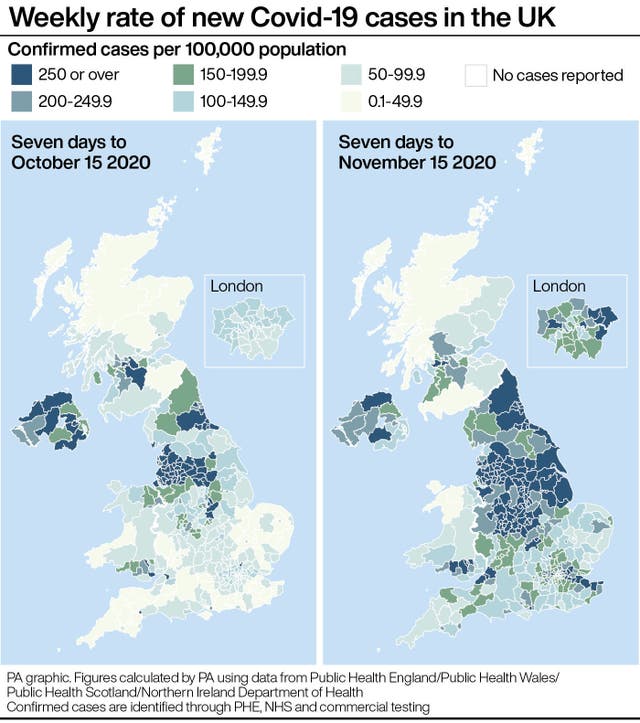UK best placed to identify coronavirus reinfections when they occur, says expert
Dr Andrew Page, of the Quadram Institute, said reinfections were likely at some point in the future.

The UK is currently the best placed country in the world to identify cases of Covid-19 reinfection when they occur, an expert has said.
Dr Andrew Page, head of informatics at the Quadram Institute in Norwich, which is a partner in the Covid-19 Genomics UK (COG-UK) consortium, has said that reinfections are likely at some point in the future, based on what is known about people’s immunity to other seasonal coronaviruses that cause the common cold.
The UK is at the forefront because a “huge number” of genomes, or genetic material, of Sars-Cov-2 – the virus that causes Covid-19 – have been recorded in the country.
The COG-UK consortium has generated and made publicly available more than 100,000 genomes of the coronavirus responsible for the pandemic, making up over 45% of the global total.
Dr Page said that while reinfection cases were likely, it was unclear when they might occur.
He said: “We know from other coronaviruses that immunity wanes, but it is a question of how long.
“At the moment, we don’t really know – only time will tell.
“It may be a year, it may by five years.”
Although there have been reports of reinfections around the world, Dr Page said the UK was yet to see any cases.
In August, a 33-year-old man from Hong Kong became the first person to have a confirmed Sars-Cov-2 reinfection.
It is thought that he picked up his second infection when he passed through the UK in August on his way home from Spain.
Since then, there have been more than a dozen cases of suspected or confirmed Covid-19 reinfections.
He said: “It is exceptionally rare in the world at the moment.
“In the UK, we have now sequenced so many of the samples, and they link back to NHS numbers, so we will know when someone is infected twice.”
Meanwhile, early findings from a recent study by the University of Oxford suggest people who previously had Covid-19 were unlikely to become ill with the disease for at least six months.
Dr Page said there were currently around 200 different lineages of Sars-Cov-2 circulating in the UK.
He said: “Most of the cases in the UK are accounted for by a small number of lineages.
“Virtually all samples in the UK have the D614G mutation now, and mostly have done since April.”
The COG-UK consortium has recently received £12.2 million in Government funding to expand whole genome sequencing of positive Sars-Cov-2 virus samples, with the aim of mapping how Covid-19 spreads and evolves.
Dr Page said: “As the virus mutates, you get random changes and then these random changes can be seen in different parts of genome.
“(Based on these changes) we can tell kind of roughly where the mutation has been seen in the world.”

He said that a coronavirus outbreak at a chicken factory in Norfolk was traced back to someone who had recently returned from Portugal, thanks to genome sequencing.
Dr Page added: “When someone comes back from, say, a holiday, with fair confidence, we can tell where it has come from, is it new, and whether it has been seen in the UK.
“We can do these investigations and it does help inform the people who are doing the contact tracing simply by linking things together, so they can make better decisions.”
Dr Page said he did not think coronavirus mutations were likely to affect vaccine development.
At the moment, it is not clear whether or not vaccines from Moderna and Pfizer, which have been found to be effective in global trials, can protect against coronavirus infection or simply against developing symptoms once someone is infected.





